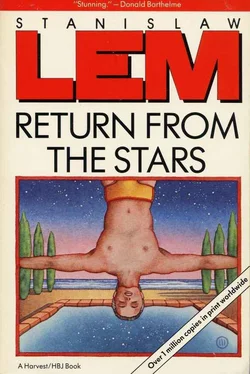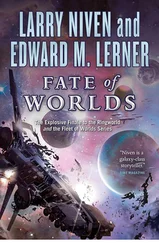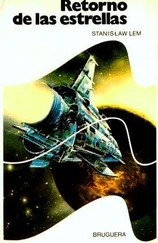“And mathematics?”
“No. Not right away. At first I took up languages, and I stuck with that until the end, even though I knew it might be futile, for when I returned, some might have become archaic dialects. But Gimma — and Thurber, especially — urged me to learn physics. Said it might be useful. I tackled it, along with Arder and Olaf Staave, but we three were not scientists…”
“You did have a degree.”
“Yes, a master’s degree in information theory and cosmodromia, and a diploma in nuclear engineering, but all that was professional, not theoretical. You know how engineers know mathematics. So, then, physics. But I wanted something more — of my own. And, finally, pure mathematics. I had no mathematical ability. None. I had nothing but persistence.”
“Yes,” he said quietly. “One would have to have that to fly…”
“Particularly to become a member of the expedition,” I corrected him. “And do you know why mathematics had this effect? I only came to understand this there. Because mathematics stands above everything. The works of Abel and Kronecker are as good today as they were four hundred years ago, and it will always be so. New roads arise, but the old ones lead on. They do not become overgrown. There… there you have eternity. Only mathematics does not fear it. Up there, I understood how final it is. And strong. There was nothing like it. And the fact that I had to struggle was also good. I slaved away at it, and when I couldn’t sleep I would go over, in my mind, the material I had studied that day.”
“Interesting,” he said. But there was no interest in his voice. I did not even know whether he was listening to me. Far back in the park flew columns of fire, red and green blazes, accompanied by roars of delight. Here, where we sat, beneath the trees, it was dark. I fell silent. But the silence was unbearable.
“For me it had the value of self-preservation,” I said. “The theory of plurality… what Mirea and Averin did with the legacy of Cantor, you know. Operations using infinite, transfinite quantities, the continua of discrete increments, strong… it was wonderful. The time I spent on this, I remember it as if it were yesterday.”
“It isn’t so useless as you think,” he muttered. He was listening, after all. “You haven’t heard of Igalli’s studies, I suppose?”
“No, what are they?”
“The theory of the discontinuous antipole.”
“I don’t know anything about an antipole. What is it?”
“Retronihilation. From this came parastatics.”
“I never even heard of these terms.”
“Of course, for it originated sixty years ago. But that was only the beginning of gravitology.”
“I can see that I will have to do some homework,” I said. “Gravitology — that’s the theory of gravitation?”
“Much more. It can only be explained using mathematics. Have you studied Appiano and Froom?”
“Yes.”
“Well, then, you should have no difficulty. These are metagen expansions in an n-dimensional, configurational, degenerative series.”
“What are you saying? Didn’t Skriabin prove that there are no metagens other than the variational?”
“Yes. A very elegant proof. But this, you see, is transcontinuous.”
“Impossible! That would… but it must have opened up a whole new world!”
“Yes,” he said dryly.
“I remember one paper by Mianikowski…” I began.
“Oh, that is not related. At the most, a similar direction.”
“Would it take me long to catch up with everything that has been done in all this time?” I asked.
He was silent for a moment.
“What use is it to you?”
I did not know what to say.
“You are not going to fly any more?”
“No,” I said. “I’m too old. I couldn’t take the sort of accelerations that… and anyway… I would not fly now.”
After these words we were silent for good. The unexpected elation with which I had talked about mathematics had suddenly evaporated, and I sat beside him, feeling the weight of my own body, its unnecessary size. Outside of mathematics we had nothing to say to each other, and we both knew it. Then it occurred to me that the emotion with which I had spoken of the blessed role of mathematics on the voyage was a deception. I had been deceiving myself with the modesty, the serious heroism of the pilot who occupies himself, in the gaps of the nebulae, with theoretical studies of infinity. Hypocrisy. For what had it been, really? If a castaway, adrift for months at sea, has a thousand times counted the number of wood fibers that make up his raft, in order to keep sane, should he boast about it when he reaches land? That he had the tenacity to survive? And what of it? Who cared? Why should it matter to anyone how I had filled my poor brain those ten years, and why was that more important than how I had filled my stomach? I must stop playing the quiet hero, I thought. I will be able to allow myself that when I look the way he does. I must concentrate on the future.
“Help me get up,” he said in a whisper.
I led him to a gleeder that stood in the street. We went very slowly. Where there were lights, among the hedges, people followed us with their eyes. Before he got into the gleeder he turned to say good-bye to me. Neither he nor I could find anything to say. He made an unintelligible motion with his hand, from which one of the canes jutted like a sword, shook his head, and got inside; the dark vehicle floated off noiselessly. I stood with my arms hanging until the black gleeder had disappeared in a stream of others. I stuck my hands in my pockets and moved on, unable to answer the question of which of us had chosen better.
That nothing remained of the city that I had left behind me, not one stone upon another, was a good thing. As if I had been living, then, on a different Earth, among different men; that had begun and ended once and for all, and this was new. No relics, no ruins to cast doubt on my biological age; I could forget about its Earthly reckoning, so contrary to nature — until that incredible coincidence brought me together with a person whom I had last seen as a small child; the whole time, sitting next to him, looking at his hands, dry as a mummy’s, and at his face, I had felt guilt and knew he was aware of this. What an improbable accident, I repeated over and over again, inanely, until I realized that he could have been drawn to this place by the same thing that had drawn me: growing there, after all, was that chestnut tree, older than either of us. I had no idea yet how far they had gone in increasing the span of human life, but I could see that Roemer’s age was something exceptional: he must have been the last or one of the last of his generation. If I had not left Earth, I would no longer be alive, I thought, and for the first time I saw an unexpected reverse side to our expedition: the subterfuge, the cruel trick that I had played on others. I walked on blindly. Around me was the noise of a crowd, a stream of pedestrians bore me along and pushed me — then I stopped, suddenly awake.
There was an indescribable racket; in the midst of mingled shouts and music, volleys of fireworks burst into the sky, hanging high above in colorful bouquets; burning spheres rained on the tops of the nearby trees; at regular intervals came the piercing sound of many voices, a howl of terror mixed with laughter, exactly as if somewhere close by there was a roller coaster, but I looked in vain for the trestles. In the middle of the park stood a large building with towers and battlements, like a fortified castle transported from the Middle Ages; the cold flames of neon lights, licking its roof, arranged themselves every few seconds into the words MERLIN’S PALACE. The crowd that had led me here made for the side, toward the crimson wall of a pavilion, unusual in that it resembled a human face, with smoldering eyes for windows, and a huge, distorted mouth, full of teeth, opened to swallow the next helping of jostling people, to the accompaniment of general merriment; each time, the mouth consumed the same number — six. At first my intention was to get out of the crowd and leave; but that would not have been easy, and besides, I had nowhere to go, and the thought came to me that out of all the possible ways of spending the rest of the evening, this one, unknown, might not be the worst. I appeared to be the only one by myself — there were mostly couples, boys and girls, men and women, lined up two by two — and when my turn came, heralded by the white flash of the huge teeth and the gaping crimson darkness of the mysterious throat, I found myself in a predicament, because I did not know whether I could join an already completed six. At the last moment the decision was made for me by a woman who stood with a young dark-haired man dressed more extravagantly than all the others: she grabbed me by the hand and without ceremony pulled me after her.
Читать дальше











